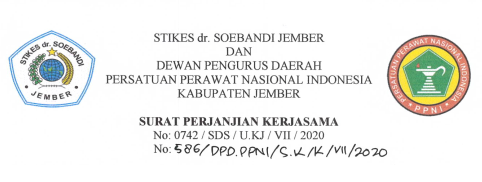Effectiveness Of RJP Training With Jigsaw Method Of Knowledge and Skills RJP On Nursing Students
DOI:
https://doi.org/10.36858/jkds.v8i1.162Keywords:
Knowledge, Skills, Cardiopulmonary Resuscitation (CPR), Jigsaw MethodeAbstract
Heart disease is one of the leading causes of death in all ages because it is a major cause of cardiac arrest. Out of Hospital Cardiac Arrest (OHCA) is twice aslarge as In-Hospital Cardiac Arrest (IHCA). Someone who act as RJP bystander and able to perform RJP actions are recommended solutions. RJP training in the community has not been done much because it still has many obstacles. The selection of effective and efficient training methods will facilitate the implementation of RJP training and increase the number of RJP bystander. Objective of the research to identify the effectiveness of the jigsaw method on knowledge and skills to perform RJP in nursing students of STIKES Banyuwangi. This research design uses Quasy experiment with pretest and posttest one group design. Using simple random sampling with a total sample of 48 respondents nursing student at STIKES Banyuwangi. The results showed that the Paired Sample T test on the knowledge variable between the pretest and posttest scores had a value of p = 0.001 (p <0.05) and the Wilcoxon test results between the pretest and posttest skill scores had a value of p = 0.001 (p <0.05) . The results of both tests mean, there is a significant increase in knowledge and skills after receiving RJP training using jigsaw method. RJP training with jigsaw method is effective to increasing knowledge and skills perform RJP in nursing students of STIKES Banyuwangi.
Keywords: ,





